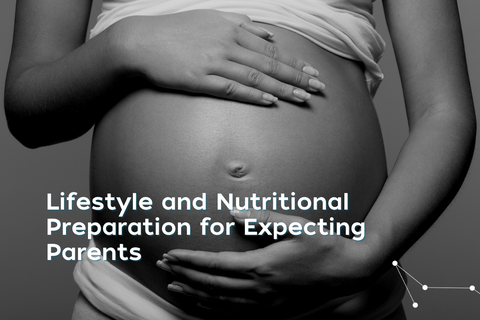The health of both the maternal and paternal parties at conception is important for the health outcomes of the infant but the period before conception (2-3 months prior) is a crucial time for optimising gamete function and early placental development. This is when supplementation is recommended, not only for females but also for males.
Men’s health at and prior to conception plays a significant role through genetic influence of the quality of spermatozoa and through the psycho-social determinants of health. Research is starting to show a deterioration in the quality of human semen by 50-60% of the last 40 years.
The structure of spermatozoa can be affected by high-fat diets, unhealthy lifestyles and obesity, which leads towards the potential for developing hypothalamic-pituitary-gonadal axis (HPGA) disorders, and an increase in oestrogen levels whilst simultaneously decreasing testosterone, luteinising hormone (LH) and follicle-stimulating hormone (FSH) levels. In overweight males who were following high saturated fat diets, when compared with healthy dietary models, sperm count, sperm concentration, motility and lower sperm DNA fragmentation was seen.
Environmental factors impacting sperm
Environmental factors can significantly impact the levels of male fertility. Cigarette and cannabis smoking, anabolic steroid use, excessive exposure to high temperatures, tight fitting clothing, excessive alcohol consumption, emotional stress, age, environmental pollution, exposure to pesticides and toxins, sedentary lifestyles, cytotoxic drugs, cadmium and lead can all negatively influence fertility outcomes. Whilst some environmental factors are unable to be avoided, research suggests resveratrol, an antioxidant found in grapes, peanuts, pistachios, blueberries, cranberries and even cocoa, may be of therapeutic value as an alternative. Diet and overall lifestyle has also been shown to have a direct association to the quality of semen and maintaining proper reproductive functioning.
Recommended nutrients for men
To help minimise oxidative stress, ensuring a diet rich in zinc, selenium, folic acid, N-acetyl cysteine, antioxidant vitamins such as Vitamin C and E, omega-3 fatty acids, carnitine and coenzyme Q10 supplementation has shown promising outcomes on sperm parameters. As well as fresh fruit and vegetables, whole-grains and fibre-rich products, lean sources of protein, legumes, fish and seafood and unsaturated fatty acids like olive oil, nuts, seeds and avocado are a part of the dietary recommendations for men wanting to conceive.
Nutritional status for women
Nutritional status and micronutrient intake for women is an important aspect of health before, during and after pregnancy. The World Health Organization has estimated 2 million people have micronutrient deficiencies, women being most at risk due to menstruation and high metabolic demands of pregnancy. Multiple cohort studies have suggested monitored dietary patterns for 3 years prior to conceiving including high intake of fruits, vegetables, legumes, nuts, fish and reduced intake of processed and red meats reduced the risk of gestational diabetes, hypertensive disorders of pregnancy and preterm birth. Whilst many individuals do not plan 3 years ahead, it is of greatest importance that consistent balanced nutrition and lifestyle interventions where necessary are prioritised throughout the lifespan.
Recommended for women:
Folate
Folate, or Folic acid, can reduce the risk of developing neural tube defects by up to 70%, it can reduce the risk of preeclampsia, miscarriage, low birth weight, stillbirth, neonatal death and autism in children. Recommended dosage of folate supplementation is between 600-800 micrograms per day from 12 weeks before conception and through the first 12 weeks of pregnancy. Encouraging the consumption of foods rich in folate alongside supplementation is of great benefit. Folate rich foods include green leafy vegetables, liver, nuts, beans and lentils, eggs, peanut butter, broccoli, oranges, avocado, or fortified breads and cereals.
Iodine
Iodine is an essential nutrient for the development of the brain and nervous system. Requirements of iodine are increased during both pregnancy and breastfeeding. However it is important to note that women with pre-existing thyroid conditions should seek advice from their doctor before taking an iodine supplement. For those that are safe to take it is advised for women to take 150 micrograms of iodine per day, and continue this throughout pregnancy and breastfeeding. Iodine rich foods that women can incorporate into their diet alongside supplementation include seafood, dairy foods, fortified breads and iodised salt.
Iron
Iron deficiency or anaemia, is a common problem for many women of reproductive age. Iron works alongside potassium, sodium and water to increase blood flow, helping to ensure sufficient supply of oxygen is given to the mother and the baby. Low levels of ferritin and hemoglobin have shown an increased risk of low birth weight and poor foetal growth. Pairing iron supplementation with folic acid acid has been effective in improving iron stores and preventing anaemia during later gestation. The recommended daily intake of iron per day is 27mg, and to pair it alongside some vitamin C to help increase its absorption. Food sources of iron include: dark leafy green vegetables, citrus fruits, enriched breads or cereals, lean beef and poultry and eggs.
Zinc
Deficiency in zinc can compromise placental and foetal growth and the closure of the neural tube. This is why supplementing with a woman’s multivitamin can be of benefit and has shown a reduction in risk for developing limb reduction defects and congenital urinary tract abnormalities when compared to straight folic acid use alone.
Calcium
Regular supplementation of calcium is required during pregnancy at a dose of 1000mg per day, ideally with the dosage split (2 x 500mg dosages). Calcium is essential for the growth of the babies bones and assists regulation of fluids in the body. Sources of calcium can be found in milk, yoghurt, cheese, salmon, shrimp, canned light tuna, calcium-set tofu and dark leafy greens.
Protein
Protein is essential, not just for the mother during pregnancy to assist in uterine and breast tissue growth, but also for the growth of the baby's tissues and organs as well as increasing blood supply throughout the mother and baby’s bodies. Protein requirements increase throughout each trimester so depending on the weight of the mother, requirements may range anywhere between 70-100g per day. Be sure to check with your GP or dietitian to find out specific ranges. Sources of protein include lean beef, pork, poultry and fish, nuts, tofu, dairy products and beans.
Body composition throughout pregnancy
Body composition for the mother, both underweight and overweight have been associated with substantial risk factors for the health of the mother and child. The global prevalence of underweight women (having a BMI <18.5kg/m²) decreased from 15% down to 10% after an analysis in 200 countries of adult BMI from 1975 to 2014 was conducted. Unfortunately this analysis showed the global prevalence of obesity rose from 6% to 15% in women (BMI⪰30 kg/m²) in both high income countries and low to middle income countries with up to 50% being overweight or obese once fallen pregnant. Obesity in pregnancy has been associated with an increased risk of both maternal and perinatal outcomes, the inability to conceive, pre-eclampsia, gestational diabetes, macrosomia, congenital anomalies, stillbirths, low birth weight, unsuccessful breastfeeding and even maternal death. Lifestyle interventions that assisted in a preconception weight loss of 10% taken by a study of 226,958 pregnancies in Canada was associated with a clinically significant reduction in risk surrounding pregnancy conditions as mentioned above.
BMI (Body Mass Index)
|
Start weight |
BMI |
Suggested weight gain |
|
Underweight |
< 18.5 |
12 - 18 kg |
|
Average weight |
18.5 - 24.9 |
11 - 15 kg |
|
Overweight |
25 - 29.9 |
6 - 11 kg |
|
Obese |
> 30.0 |
4 - 9 kg |
It is also important to note that for many women, weight and weight stigma can be a mentally and emotionally debilitating topic outside of being pregnant. Losing weight or intentionally preventing weight gain during pregnancy can be harmful to both yourself and the baby, so whilst this is a guide, if there are no adverse health risks with the mothers weight, focus instead on consuming a variety of healthy and nutritious foods rather than the weight on the scales.
Exercise
Exercise has shown to be an effective intervention to decrease the mothers risk of gestational diabetes, preeclampsia, maternal weight gain, improved birth weight and increased chances of a normal delivery. The Australian Dietary Guidelines suggests women that are planning to fall pregnant should participate in regular physical activity but are advised to talk to their general practitioner or health care professional before beginning any new activities. The recommendations are as follows:
-
Muscle strengthening activities at least 2 days per week, as well as
-
2½ to 5 hours of moderate intensity physical activity each week, OR
-
1¼ to 2½ hours of vigorous intensity physical activity each week, OR
-
An equivalent combination of moderate and vigorous intensity activity each week
Exercises like swimming, walking, yoga and pilates can be great choices to get your body moving without overdoing it. It is important to drink plenty of water to avoid becoming dehydrated and avoiding overheating.
Alcohol and caffeine consumption
Whilst this next information is targeted for during pregnancy, it is still extremely important and can be integrated into a preconception plan. Alcohol consumption of the mother during pregnancy can result in a range of foetal alcohol spectrum disorders, which can lead to physical, behavioural and learning difficulties. Caffeine consumption whilst pregnant has also been associated with a reduction of birth weight similar to that caused by alcohol consumption during pregnancy.
Overall, it is important to maintain healthy and balanced nutrition and lifestyle choices for both the males and females involved. Creating a baby is a magical experience so it is important that everyone (the mums, dads and bubs) is given the best opportunity to thrive.
References
-
Queensland Health - Pre-conception https://www.health.qld.gov.au/clinical-practice/guidelines-procedures/clinical-staff/maternity/nutrition/lifestyle/pre-conception
-
Stephenson, J., Heslehurst, N., Hall, J., Schoenaker, D., Hutchinson, J., Cade, J. E., Poston, L., Barrett, G., Crozier, S. R., Barker, M., Kumaran, K., Yajnik, C. S., Baird, J., & Mishra, G. D. (2018). Before the beginning: nutrition and lifestyle in the preconception period and its importance for future health. Lancet (London, England), 391(10132), 1830–1841. https://doi.org/10.1016/S0140-6736(18)30311-8
-
Shawe, J., Patel, D., Joy, M., Howden, B., Barrett, G., Stephenson, J. (2019). Preparation for fatherhood: A survey of men’s preconception health knowledge and behaviour in England. PLOS ONE. https://doi.org/10.1371/journal.pone.0213897
-
Skoracka, K., Eder, P., Łykowska-Szuber, L., Dobrowolska, A., & Krela-Kaźmierczak, I. (2020). Diet and Nutritional Factors in Male (In)fertility-Underestimated Factors. Journal of clinical medicine, 9(5), 1400. https://doi.org/10.3390/jcm9051400



